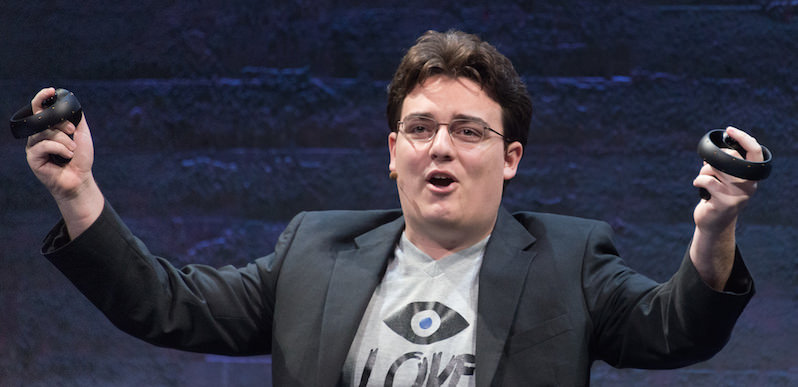Oculus Founder Is Developing New Surveillance Technology With Help From Peter Thiel
Palmer Luckey, the 24-year-old Silicon Valley wunderkind, is planning a comeback after being forced to leave Facebook, which acquired his virtual reality company for $2 billion in 2014. Palmer Luckey, the founder of Oculus, at the company's Step into the Rift event in San Francisco in 2015. (eVRydayVR / Flickr)
Palmer Luckey, the founder of Oculus, at the company's Step into the Rift event in San Francisco in 2015. (eVRydayVR / Flickr)
Palmer Luckey, the founder of Oculus, at the company’s Step into the Rift event in San Francisco in 2015. (eVRydayVR / Flickr)
Palmer Luckey, the 24-year-old founder of Oculus VR, has a new startup. According to The New York Times, Luckey is working on building a virtual border wall with help from Peter Thiel, the Silicon Valley billionaire who is one of Donald Trump’s biggest supporters.
The Times reports:
[Luckey’s new company] is developing surveillance technology that could be deployed on borders between countries and around military bases, according to three people familiar with the plan who asked for anonymity because it’s still confidential. They said the investment fund run by Peter Thiel, a technology adviser to Mr. Trump, planned to support the effort.
In an emailed statement, Mr. Luckey confirmed that he was working on a defense-related start-up.
“We are spending more than ever on defense technology, yet the pace of innovation has been slowing for decades,” he wrote. “We need a new kind of defense company, one that will save taxpayer dollars while creating superior technology to keep our troops and citizens safer.”
In 2004, Thiel founded Palantir, a software company based in Palo Alto, Calif, that specializes in data mining. According to The Intercept, Palantir has helped the NSA expand its global spying operations and is creating a new intelligence system called Investigative Case Management (ICM) that Immigration and Customs Enforcement (ICE) will use to power Trump’s deportation efforts.
The ICM program is expected to be ready for deployment this fall, according to CNBC, and immigrant rights advocacy groups are concerned about how it will be used.
“If President Trump’s massive round-ups of undocumented immigrants are going to happen, these are the databases that are going to be used and there are going to be very powerful databases,” Jay Stanley, senior policy analyst with the ACLU, said. “I think that Americans have always been suspicious of government power and when the government gains tools that are so powerful and can be used not just against undocumented immigrants but against regular Americans potentially — that’s something that raises a lot of eyebrows.”
Oculus VR makes virtual reality hardware and software, and Luckey sold the company to Facebook in 2014 for $2 billion when he was 21. In March, he “was pressured to leave Facebook months after news spread that he had secretly donated to an organization dedicated to spreading anti-Hillary Clinton internet memes.” Luckey disputed the claims and cited inaccuracies in articles, but the damage was too much to overcome.
Now Mr. Luckey is back. Unburdened by a big company’s culture, he’s more freely sharing his politics on social media. He also contributed $100,000 to Mr. Trump’s inauguration, through one of his companies, according to Federal Election Commission records.
Read the whole Times story here.
—Posted by Eric Ortiz
Your support matters…Independent journalism is under threat and overshadowed by heavily funded mainstream media.
You can help level the playing field. Become a member.
Your tax-deductible contribution keeps us digging beneath the headlines to give you thought-provoking, investigative reporting and analysis that unearths what's really happening- without compromise.
Give today to support our courageous, independent journalists.






You need to be a supporter to comment.
There are currently no responses to this article.
Be the first to respond.